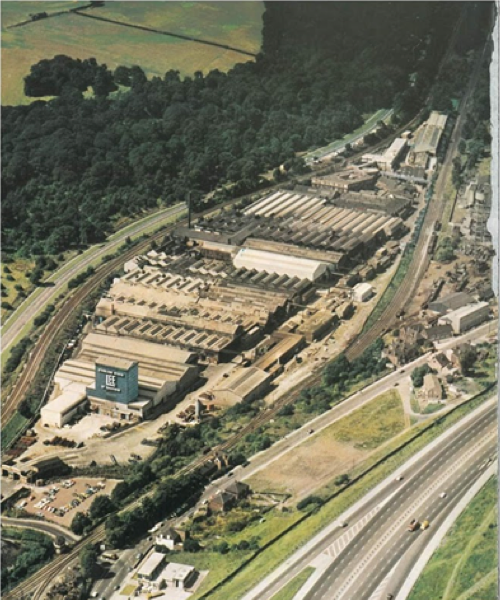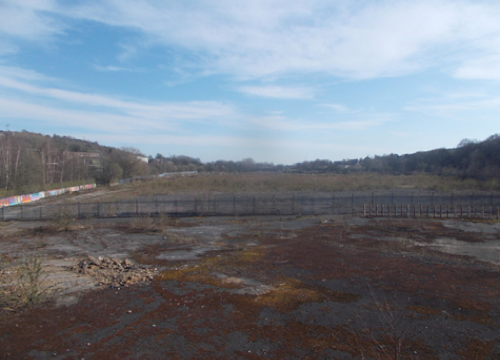
Sheffield Green Party (SGP) objects to 20/02550/FUL | Full planning application for enabling works comprising access, clearance and remediation, reprofiling, drainage, flood mitigation, landscaping and associated works | Land Part Of Outokumpu Site, Fife Street And Blackburn Road And Storage Land At Grange Mill Lane Sheffield S9 because this application for “enabling works” is a platform for delivering a 500,000 sq. foot warehousing site, without proper scrutiny nor proper evaluation of the environmental & health impacts. The total impact of the transport & building works needs to be comprehensively assessed at this current stage.
The development stretches over a mile in length, & the huge amount of traffic generated would have major impacts on many planning matters in this location. It isn’t acceptable to say these would be considered in later planning applications, because the purpose of enabling works is only valid in the context of a major distribution centre being approved.
SGP endorses the objections made by the Love Wincobank Campaign, the Sheffield & Rotherham Wildlife Trust, the Transpennine Trail Partnership (TPT), Sustrans, & Cyclesheffield.
SGP also objects because of the negative impacts on:
- health of local residents: communities in the Wincobank area are being put at risk in the name of development. This will lead to conflict between jobs & human health in an area of existing health disadvantage. There has been neither an Environmental nor a Health Impact Assessment, nor any information about how the traffic generated by the proposal would affect local air quality.
- levels of noise: breaking up & removing the concrete pads (which are several metres thick), bringing new materials on site & building the new development will be noisy & will take many, many months. This will cause unacceptable noise, disruption & nuisance for residents living adjacent to the site. There have been no details of the proposed traffic movements, operation hours, etc. in this application.
- ability to withstand flooding: The proposal will affect a floodplain, increasing the likelihood of local flooding, especially downstream of the development site, where Meadowhall has already been very seriously affected by flood damage. The flood risks that hindered the previous application don’t appear to have been addressed. At the Full Council meeting in Oct. 2019, the relevant cabinet member, Cllr Bob Johnson, stated in answer to Public Question 3.3.17 concerning Climate Change & Planning that “the Council was most aware of the impacts of climate change & was taking account of that in reaching decisions in individual planning applications. This was particularly the case in respect to drainage & flooding”. Allowing this proposal to go ahead would contradict this statement.

The application urgently needs a Flood Risk Assessment, to ‘manage flood risk from all sources’. By applying the Sequential & Exception Tests, this would avoid inappropriate development in areas of high flood risk. The National Planning Policy Framework (NPPF) now requires that strategic policies consider the ‘cumulative impacts in, or affecting local areas susceptible to flooding’ (para 156, NPPF).
- ecology: several concerns are noted in the ecology report – the need for a groundwater assessment; protected/notable animal & plant species recorded within 2 kms of the land; any poorly designed lighting affecting animal populations; dangers from pollutants in the construction phase; removal of trees. Plus an additional danger that the concrete dust generated by the development work could end up in the Blackburn brook, then the Don, undoing all the good work that has been done installing fish passes at the weirs.
- air quality: Enabling more motor traffic in this area will hinder SCC’s ability to meet the EU directive for clean air, so any development which will increase traffic should be subject to greater scrutiny. The concrete dust generated by the building works will also negatively impact air quality.
- traffic: as the enabling works cannot be seen in isolation from the operation of a very large distribution centre, there needs to be a traffic management plan, because of the significant impact both on local roads & the M1.
- carbon targets: Enabling more motor traffic, including HGVs, does not fit with SCC’s commitment to be carbon neutral by 2030.
- walking & cycling: The proposed access road cuts directly across the TPT, & will endanger & inconvenience walkers & cyclists. The design of the proposed cycle/foot crossing is unsafe, & the predicted increase in traffic will cause significant delays at this point. The applicant’s own Transport notes that the “proposed pedestrian/cycle crossing is acceptable, albeit in the context that the current proposal does not generate traffic once complete.” As it’s improbable that the current proposal will not generate traffic, the conclusion would be that the crossing itself won’t be acceptable.
The proposed access road is contrary to the NPPF’s presumption in favour of sustainable development – “development proposals should prioritise pedestrian & cycle movements”.
There is no need for the access road, as the site can be accessed elsewhere, & has a railway adjacent.


Comments
The Sheffield Green Party welcomes all comments but we will not be held responsible for any user comments. We do reserve the right not to publish comments that may cause offence.